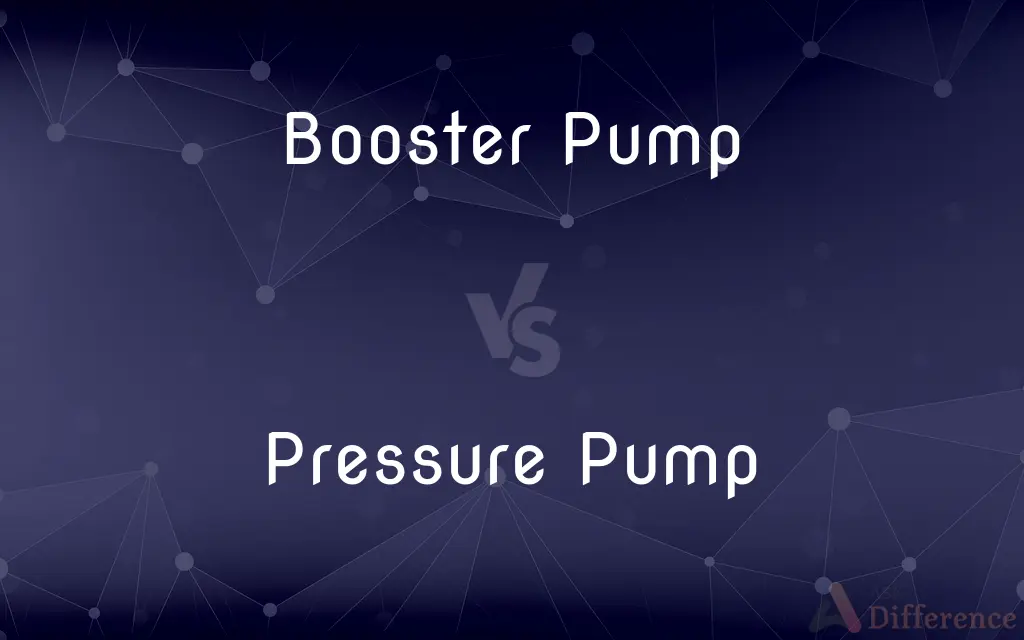Booster Pump vs. Pressure Pump — What's the Difference?
By Maham Liaqat & Fiza Rafique — Published on May 11, 2024
Booster Pump increases water flow and pressure in low water flow situations, while Pressure Pump is designed to provide a specific pressure level, often used in water supply and irrigation systems.

Difference Between Booster Pump and Pressure Pump
Table of Contents
ADVERTISEMENT
Key Differences
Booster pumps are primarily used to increase the water pressure and flow in a system where the existing pressure is insufficient. They're often installed in buildings where the water supply from the main line doesn't meet the required pressure for upper floors or distant outlets.
Pressure pumps, on the other hand, are designed to deliver water at a consistent pressure. They're crucial in systems that require a constant pressure for operations, such as irrigation systems, where they ensure that water is evenly distributed across all points.
Both types of pumps are essential in maintaining water supply systems, but their applications differ significantly. Booster pumps are more about compensating for low pressure in certain parts of a system, whereas pressure pumps focus on maintaining a set pressure level throughout the system.
In terms of installation, booster pumps are typically added to existing systems to solve specific pressure problems. Pressure pumps are more integral to the design of a system that requires a consistent pressure from the outset.
The choice between a booster pump and a pressure pump depends on the specific needs of the water supply system. Understanding the requirements of the system, whether it's increasing flow, maintaining pressure, or both, is crucial in selecting the appropriate pump.
ADVERTISEMENT
Comparison Chart
Primary Function
Increases flow and pressure in low-pressure areas
Provides consistent pressure for various applications
Typical Use
Buildings with insufficient main line pressure
Irrigation systems, water supply systems requiring constant pressure
Installation
Added to existing systems to address specific issues
Integral to system design for consistent pressure needs
Operation
Activates when flow is insufficient
Runs to maintain set pressure level
Key Benefit
Solves low water pressure problems
Ensures even water distribution and pressure
Compare with Definitions
Booster Pump
Helps in distributing water over long distances.
Rural water systems use booster pumps to ensure water reaches distant homes.
Pressure Pump
Automatically adjusts to maintain desired pressure.
The pressure pump kicks in when the system's pressure drops below the set point.
Booster Pump
Often installed in series with the main pump.
A booster pump was placed downstream of the main pump to increase the system's efficiency.
Pressure Pump
Often used in conjunction with pressure tanks.
The pressure pump and tank combo provides a steady water supply to the entire house.
Booster Pump
Designed to enhance flow rate in addition to pressure.
A booster pump was added to the garden irrigation system for better water coverage.
Pressure Pump
A pump that delivers water at a specific pressure.
The farm's pressure pump maintains consistent irrigation across all fields.
Booster Pump
A device for increasing water pressure in a system.
The apartment building installed a booster pump to improve shower pressure on higher floors.
Pressure Pump
Essential for systems requiring constant pressure.
Our pressure pump ensures that the spray nozzles work efficiently throughout the operation.
Booster Pump
Can be used in both residential and commercial settings.
The hotel's booster pump ensures all guests have adequate water pressure.
Pressure Pump
Can vary in size depending on the application.
A small pressure pump is sufficient for a home garden's drip irrigation system.
Common Curiosities
Is a pressure pump necessary for a home water supply system?
It depends on your water source and the need for consistent pressure; it's crucial for systems that require a constant pressure level.
How do I know if I need a booster pump or a pressure pump?
Assess whether your issue is inconsistent pressure throughout the system (pressure pump) or insufficient pressure in certain areas (booster pump).
How does a pressure pump differ from a booster pump?
A pressure pump is designed to maintain a specific pressure level, whereas a booster pump increases flow and pressure where needed.
Can booster pumps be used with any type of fluid?
They are typically designed for water, but some models can handle other fluids; check the manufacturer's specifications.
Are booster pumps more expensive than pressure pumps?
Costs vary based on size and specifications; the application and required performance largely determine the price.
Do I need a professional to install these pumps?
Professional installation is recommended to ensure optimal performance and avoid system damage.
What is the main purpose of a booster pump?
To increase water flow and pressure in parts of a system where it is insufficient.
Is it possible to adjust the pressure level on a pressure pump?
Yes, many models allow for pressure adjustments to suit specific needs.
Can I use a booster pump for my garden irrigation system?
Yes, if your system suffers from low water pressure, a booster pump can help improve flow and coverage.
What's the difference in maintenance between the two pumps?
Maintenance is similar, focusing on regular checks and keeping the system clean, but specifics depend on the pump model and application.
Can a pressure pump improve water flow as well as pressure?
Its primary role is to maintain pressure; any improvement in flow is a secondary effect.
What happens if a booster pump is too powerful for my system?
It can cause damage to pipes and fixtures due to excessive pressure; proper sizing is crucial.
How long do these pumps typically last?
With proper maintenance, both types of pumps can last many years, but lifespan varies by model and usage.
Can I use a pressure pump for a high-rise building water supply?
Yes, but it may need to be part of a more complex system designed for such applications.
What safety features should I look for in these pumps?
Look for overheat protection, dry run protection, and automatic shut-off features to prevent damage and ensure safe operation.
Share Your Discovery

Previous Comparison
Trial Court vs. Appellate Court
Next Comparison
Waterproof Flooring vs. Water Resistant FlooringAuthor Spotlight
Written by
Maham LiaqatCo-written by
Fiza RafiqueFiza Rafique is a skilled content writer at AskDifference.com, where she meticulously refines and enhances written pieces. Drawing from her vast editorial expertise, Fiza ensures clarity, accuracy, and precision in every article. Passionate about language, she continually seeks to elevate the quality of content for readers worldwide.














































